As a tumultuous 2023 comes careening to a halt, we at Eureka Street find ourselves in a white knuckled, slightly frazzled, yet strangely contemplative mood. Over these last few weeks, we’ve been sifting through the detritus of the year, considering those big hearts and bright intellects who have either made an impact in elevating the wider discussion, inching us closer to a better world.
And the discussions leading up to this weren’t pretty. Beckettesque, even. There was a certain quality that seemed lacking in the luminaries of 2023 that made nominating a ‘person of the year’ more difficult than expected. Nevertheless, we pressed on and I must say, there’s something restorative in an annual retrospective, mulling over those whose efforts and achievements inspired us this past 12 months.
Our final selection spans the gamut from political and legal heavyweights to quiet innovators and social justice revolutionaries; people who somehow left a mark on our collective consciousness, pointing us towards a more hopeful future. And it goes without saying, we probably missed the person you think is most worthy – there are 8 billion of us and we each had to choose one – so feel free to add your own pick in the comments. As we turn the page on 2023, we doff our caps to these groups/individuals.
Michael McVeigh, Head of publishing and digital content at Jesuit Communications, publishers of Eureka Street. Pope Francis
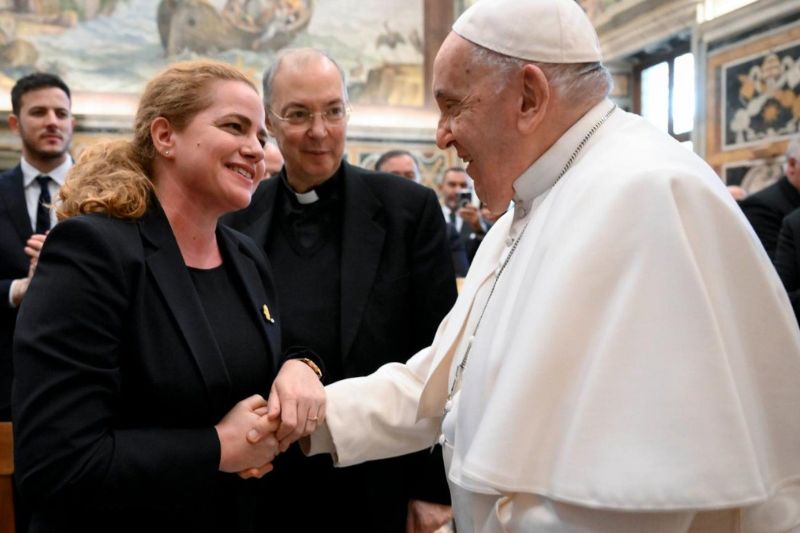
Pope Francis turned 87 on 17 December, and most would forgive him for retreating a little from public life. However, there was no slowing down in 2023. Despite ongoing struggles with health, the Pope continued to be a source of hope for millions and a beacon of peace in a time of increasing conflict.
To name just a few highlights from the past year: The Pope embarked on a trip to the Congo and a peace mission to South Sudan in February, the first of five overseas trips which also included a visit to Mongolia; More than a million young people gathered in Lisbon for World Youth Day in August, hearing the Pope preach about hope in dark times; ‘Laudate Deum’ was released in October, offering a follow-up to the landmark encyclical Laudato Si’ that continued to push for meaningful action to address climate change; the Synod on Synodality for the first time brought together lay people (including women) and clergy to discern new ways to be Church in the world today; and while the Pope’s health prevented him from travelling to Dubai for COP28, his message to those gathered still garnered headlines.
Meanwhile, although some pushed him to take a stronger stand in international politics, particularly against Russia, the Pope remained committed to appealing to the best instincts of all actors in charting a pathway to peace. In a similar way, he condemned both sides of the Israel and Palestinian conflict for responding ‘to terror with terror’.
In times of conflict both within the Church and in the world at large, it can be difficult to hold fast to a way of being Church, to a way of being faithful to Christ’s mission, that seeks to rise above differences. As much as anything else, I nominate Pope Francis as my person of the year simply for his efforts to do just that.
Andrew Hamilton, Consulting editor of Eureka Street. Pope Francis
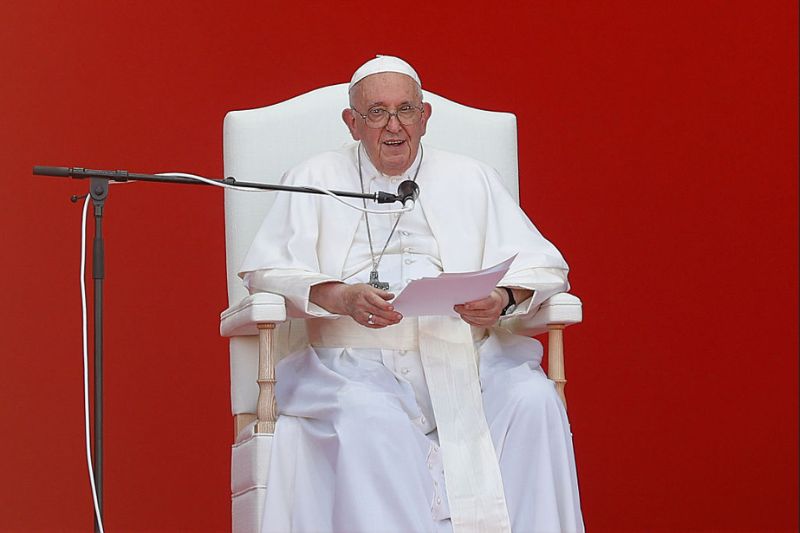
Any cleric who proposes another cleric as person of the year is likely to be dismissed as a poster boy for clericalism. Well, so be it! My vote this year still goes to Pope Francis. He has consistently put himself out to address the most serious threats to the future of humanity, and so to faith in a God who loves it. He has tried to mobilise church and world leaders to lead campaigns to avoid future global warming. He has consistently insisted on the human suffering and devastation caused by modern war and, at cost to his reputation, has given priority to a negotiated peace over the taking of sides in the wars in Ukraine and in Gaza. And he has responded to polarisation in public life and in the Catholic Church by commending a dialogue in which people reach out and listen respectfully to one another. Within the Catholic Church he has invested himself in modelling the habits of mind and heart that are a prerequisite for institutional change. This is the core of the Synodal processes. And he has done all this in gestures and words which speak simply of faith, and which allow all the limitations imposed by his age, health, cultural background and human fallibility to be on show. My only hesitation in voting for Pope Francis is that such awards usually go to winners. And the chances are that anyone who promoted respect for human beings who are threatened by global warming, by war and by polarisation, as Pope Francis, has done, will later be judged to have fought a losing battle. Still, Eureka Street is an Australian publication, and Australians have a soft spot for brave little battlers who don’t quite win. So, cleric or not, he wins my vote.
Michele Frankeni, Editor of Australian Catholics, Madonna magazine. CEOs. Will no one think of the CEOs?

It’s been tougher than normal to be a CEO and board member this year. Formal court decisions, as well as the court of public opinion have shone a light into the murky corners of executive function and remuneration. Until recently there was little questioning of CEOs, but blatant and persistent problems with many companies have shifted the balance slightly.
After bitter complaints by customers and staff, as well the ACCC’s decision to take legal action against Qantas over allegations it had sold tickets to already cancelled flights, then Qantas CEO Alan Joyce brought forward his retirement by two months. Although Joyce walked off with around $23 million in pay, he wasn’t at the annual meeting for the usual round of ‘well dones’. Another executive to face public antipathy was Optus CEO Kelly Bayer Rosmarin. A nationwide outage at the telco took down phone and internet services for 14 hours in November. The resulting mayhem for transport and business was too much for the government and public. Having also been CEO when the biggest data breach in Australia’s history occurred, following a cyber-attack on the company in 2022, there was little appetite for tolerance. Bayer Rosmarin appeared before a Senate inquiry on a Friday, refusing to discuss resignation, only to resign the following Monday. Reserve Bank governor Michele Bullock was pilloried for being out of touch with the reality of people’s lives when she said demand for services for hairdressing and dentistry, neither of which are particularly discretionary, were helping keep inflation above accepted targets. After 70 years Rupert Murdoch stepped down as chair of Fox and News Corp. While ordinarily his age of 92 is excuse enough to take it easier, there is speculation a looming court case by global election technology company Smartmatic over Fox’s coverage of Donald Trump’s stolen-election lie played into the decision. And for those already cynical about the work ethic of over-paid executives, in the US Donald Trump Jr and Eric Trump were clear the buck stopped with everyone but them when they claimed, despite having signed them, they had no knowledge of the financial statements at the heart of a $250m fraud trial. Whether these incidents lead to any long-lasting change remains to be seen, but the little chinks in corporations’ armour of business as usual have been enlightening.
Julian Butler, Editorial consultant of Eureka Street. Chief Justice Stephen Gageler AC
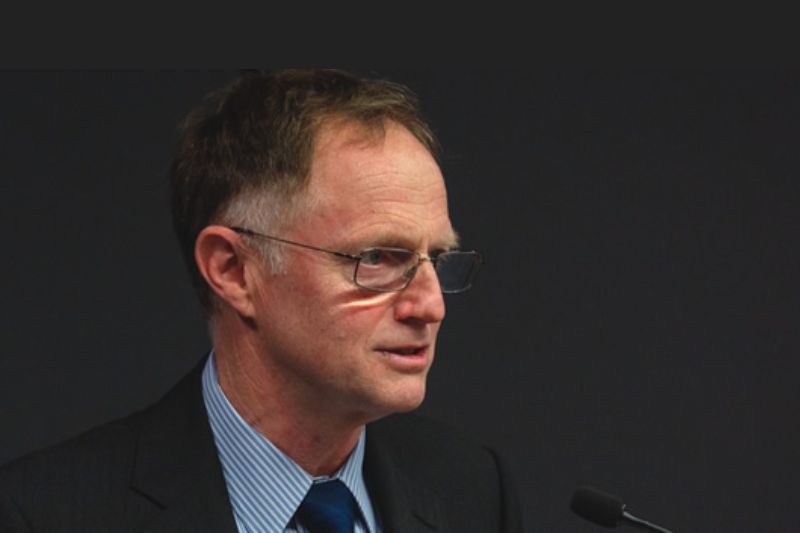
The appointment of a Chief Justice of the High Court of Australia is usually met with little public fanfare. At his swearing in on 6 November, new Chief Justice Stephen Gageler reflected on his family’s history, including an interaction with the legal system back in 1814 at the Old Bailey which ‘did not go so well.’ No one, he said, is self-made, ‘least of all me’. The new Chief Justice described himself as ‘the product of decent, hardworking parents who raised me happily in a small rural community.’ Having completed most of his primary education in a ‘one-room weatherboard building where my father was educated before me’, Gageler went on to remark that throughout his life, ‘I have benefited from accessible structures and transparent processes which have created pathways and presented opportunities to learn and to serve.’
Two days after being sworn in Chief Justice Gageler overturned a 20-year legal precedent when he indicated from the bench that a man known as 'NZYQ' was to be released from immigration detention because ‘at least a majority’ of the High Court has decided to overturn Al-Kateb v Godwin. Other have written in eloquent detail about the judgment, including Frank Brennan SJ and Kerry Murphy so I won’t rehash it here. The critical element, as Fr Brennan put it is that, ‘the government can’t keep asylum seekers locked up unless the detention is for the purposes of processing visas or of removing failed asylum seekers from Australia.’ It is for the judiciary to punish, not the executive. The executive can only detain people to meet a legitimate administrative end.
Chief Justice Gageler chose to have the Court hear the case of NZYQ in his first week. He chose to release the man prior to giving written reasons because he had determined the detention was unlawful and so ongoing detention would be unjust. The beneficiary of accessible structures and transparent processes seems committed to sharing them in his new role.
Laura Kings, Assistant editor of Australian Catholics. Australian Catholic Religious Against Trafficking in Humans (ACRATH) and Hon Linda Burney MP, Minister for Indigenous Australians and Member for Barton.
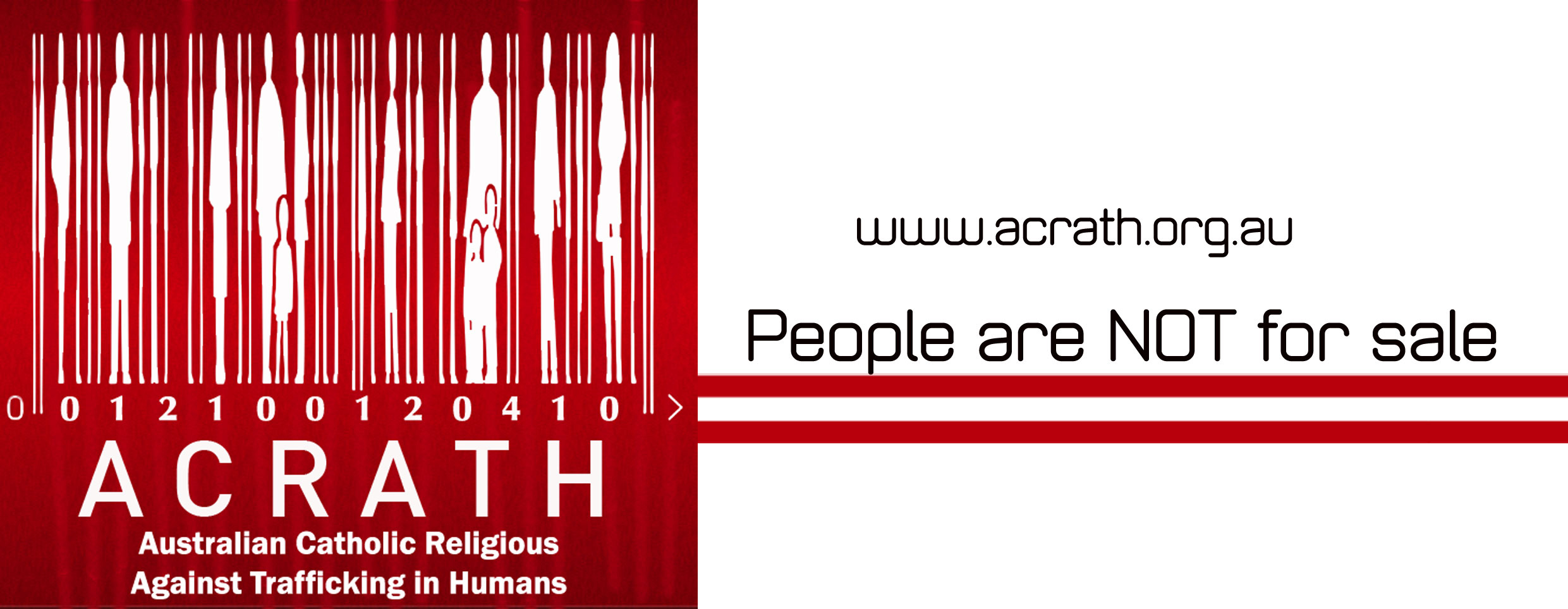
Slavery is not someone else’s problem, it’s our reality. Modern slavery includes human trafficking, forced labour, forced marriage, and more. Every time we eat or purchase, it’s likely modern slavery exists in that supply chain. Australian Catholic Religious Against Trafficking in Humans (ACRATH) have been working for close to two decades to eliminate human trafficking, address modern slavery and the resultant harm. Those in office are listening. This year there was a review of the Modern Slavery Act (2019) that seeks to strengthen it, and as much as that might scare any whose business model relies on exploitation and enslavement, it is a very good thing for an Australian society that embraces human rights. Many ACRATH members live a Catholic religious life but are upending stereotypes as they work for the betterment of others with dignity and acumen. Whether they are walking Canberra’s halls, creating school resources, or accompanying and advocating for victims, ACRATH does worthy and important work.
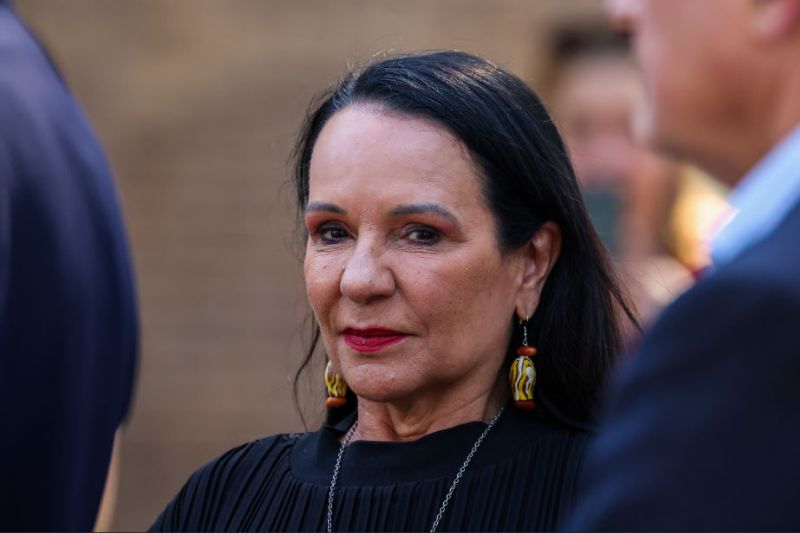 Wiradjuri woman Linda Burney is working for better outcomes for Aboriginal people at a pivotal historical moment. Her resolve, bravery and poise while traversing the muddy waters of the referendum on the Voice to Parliament were remarkable. She visibly endured a wave of vitriol. Yet, her emotional speech after the negative vote demonstrated dignity, integrity and leadership. Linda Burney could have lost her temper. She could have shouted publicly in frustration. Instead, she persisted. Even though she may be exhausted, disappointed, possibly disconsolate, the minister for Indigenous Australians appears resolved to keep working to close the gap and represent her constituents. In her post-referendum speech, Ms Burney called on First Nations people to take pride in their identity, reminded us that gains have been made, and declared that reconciliation will continue. During this difficult and confusing year, Australians were fortunate to have leaders like Linda Burney to guide us. In her words, ‘We are stronger together’.
Wiradjuri woman Linda Burney is working for better outcomes for Aboriginal people at a pivotal historical moment. Her resolve, bravery and poise while traversing the muddy waters of the referendum on the Voice to Parliament were remarkable. She visibly endured a wave of vitriol. Yet, her emotional speech after the negative vote demonstrated dignity, integrity and leadership. Linda Burney could have lost her temper. She could have shouted publicly in frustration. Instead, she persisted. Even though she may be exhausted, disappointed, possibly disconsolate, the minister for Indigenous Australians appears resolved to keep working to close the gap and represent her constituents. In her post-referendum speech, Ms Burney called on First Nations people to take pride in their identity, reminded us that gains have been made, and declared that reconciliation will continue. During this difficult and confusing year, Australians were fortunate to have leaders like Linda Burney to guide us. In her words, ‘We are stronger together’.
David Halliday, Editor of Eureka Street. The Hon Mark Dreyfus KC MP
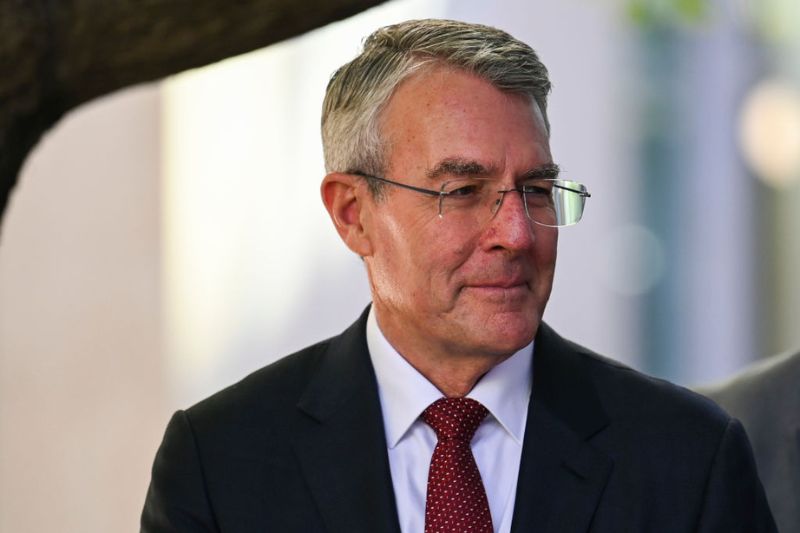
Mark Dreyfus had a pivotal role in unravelling the Robodebt scandal, an unlawful system of automated debt assessment where swathes of people were accused of owing non-existent debts to Centrelink. It was a sordid chapter in Australia's history, and as Attorney-General, Dreyfus oversaw the Royal Commission, an unflinching examination of this bureaucratic Frankenstein. This national mea culpa for a system that targeted the most vulnerable wrapped mid-year. Dreyfus tabled the government response to the RC in November, describing the scheme as ‘wrong, unlawful and destroy[ed] the lives of many Australians.’ And the RC revealed the scale of the human cost. At very least, three suicides occurred as a result including Rhys Cauzzo, 28, and Jarrad Madgwick, 22. Investigators were ‘confident that these were not the only tragedies of the kind.’
The Attorney-General has also spearheaded the Albanese Government’s anti-corruption and integrity agenda. Dreyfus has long been a bullish advocate for the establishment of a federal corruption watchdog. And this year we saw the establishment of his magnum opus, the National Anti-Corruption Commission (NACC) in July. This body, aimed at ensuring transparency and accountability in public office, reflects a new commitment to upholding democratic values and combating corruption. The NACC promises to expose the backroom deals, the whispered quid pro quos, the grubby little secrets that erode public trust in democracy.
Combating modern slavery has also been a central focus for Dreyfus this year. Modern slavery encompasses a range of serious exploitative practices, such as trafficking in persons, deceptive recruiting, debt bondage, forced labour and forced marriage. He recognized the urgency of the issue and intensified efforts at establishing modern slavery safeguarding. The Modern Slavery Act, his brainchild, stands as a testament to his belief that profit shouldn't be built on the backs of the voiceless. Dreyfus has been instrumental in steering significant legal reforms like establishing Australia’s first federal Anti-Slavery Commissioner in 2023 with the aim of supporting victims and survivors and supporting business to address modern slavery practices hidden in supply chains.
In a year often marked by political cynicism and moral ambivalence, Dreyfus has come to represent a sort of rare, old-school integrity. A study in quiet resolve, his isn’t the loudest voice in the room (unless he’s ticking off a Sky News reporter, for which he later privately apologised), but it might be the one uttering the most important words about justice and accountability.
Michael McVeigh is head of publishing and digital content at Jesuit Communications, publishers of Eureka Street.
Michele Frankeni is editor of Australian Catholics and Madonna magazine.
Julian Butler SJ is a Jesuit undertaking formation for Catholic priesthood. He previously practiced law, and also has degrees in commerce and philosophy. Julian is a contributor at Jesuit Communications, a chaplain at Xavier College, and a board member at Jesuit Social Services.
Andrew Hamilton is consulting editor of Eureka Street, and writer at Jesuit Social Services.
Laura Kings is assistant editor of Australian Catholics.
David Halliday is editor of Eureka Street.